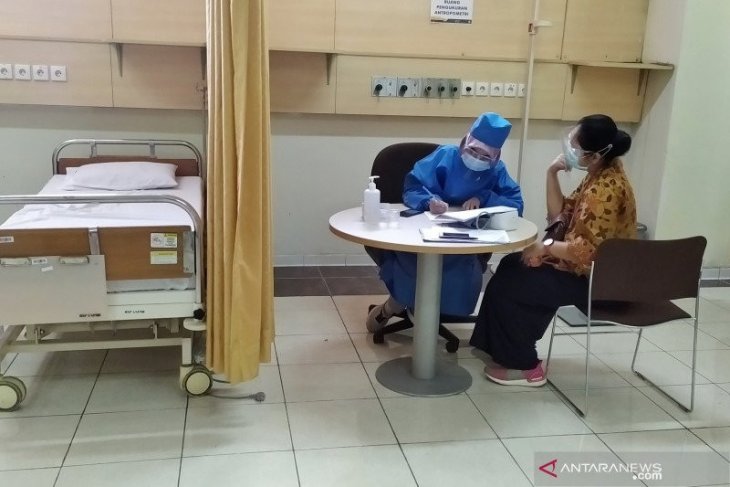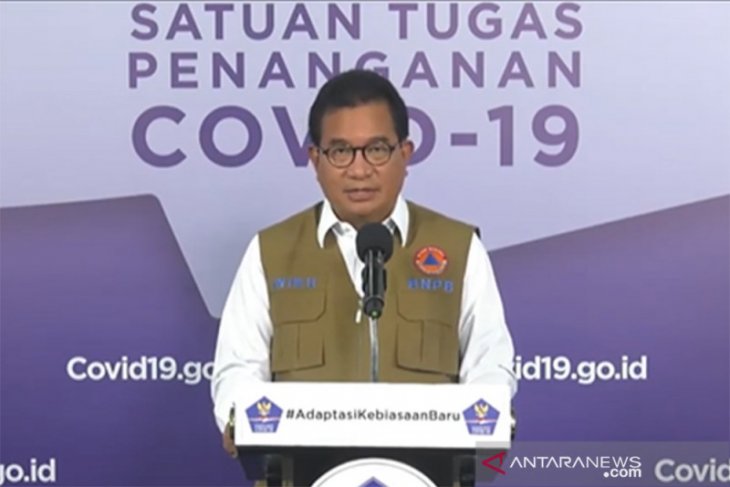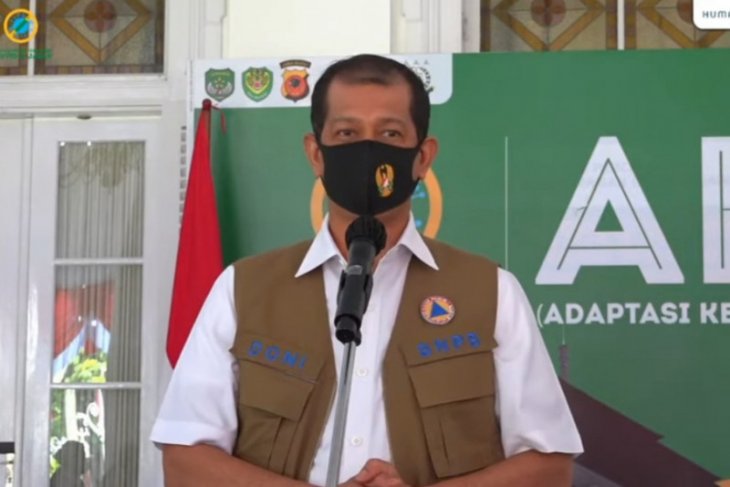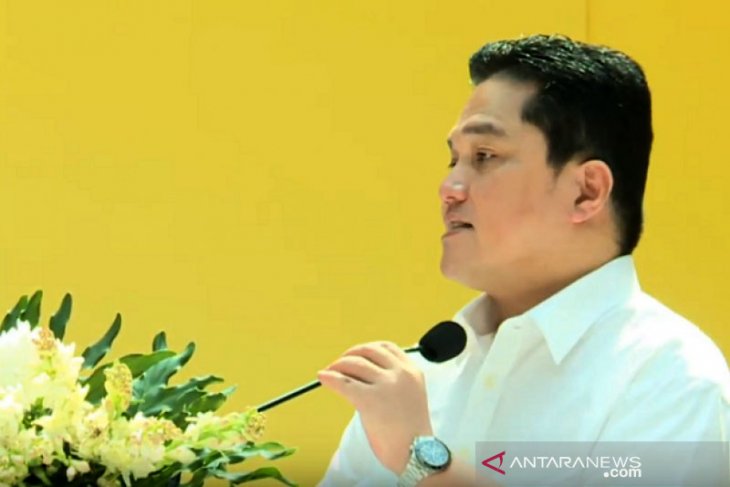Live Streaming
Program Highlight
Company Profile

Ani Hasanah
August

A medical worker interviewed volunteers for the clinical trial of the COVID-19 vaccine at the Faculty of Medicine, Padjajaran University, in Bandung on Thursday (Aug 6, 2020). ANTARA/Bagus Ahmad Rizaldi
State-owned vaccine manufacturer Bio Farma has begun the third phase of the clinical trial for a COVID-19 vaccine from China-based biopharmaceutical company Sinovac Biotech on Thursday.
"On the occasion of our 130th anniversary today on Thursday (August 6), we will start the clinical trial for development of the COVID-19 vaccine," Bio Farma President Director Honesti Basyir stated during a virtual ceremony to celebrate the pharmaceutical firm's anniversary in Bandung, West Java, on Thursday.
Basyir pointed to the wild rush among nations worldwide to find a vaccine for the novel coronavirus SARS-CoV-2 that causes COVID-19.
"Only this vaccine can help in restoring normalcy back into our lives. Of course, we do not want to wear masks and face shields and maintain social distancing forever, as it will affect our social interactions. Humans are social beings," he affirmed.
Basyir sought the support of all parties for the smooth running of the clinical trial, so that the pharmaceutical holding, also including Kimia Farma and Indofarma, could produce the vaccine.
On July 19, a total of 2,400 doses of the potential COVID-19 vaccine developed by Sinovac Biotech arrived in Indonesia and were delivered to Bio Farma, with the support of the State Enterprises Ministry and Foreign Affairs Ministry that viewed the vaccine as diplomatic goods.
Bio Farma is optimistic of commencing production of the Chinese COVID-19 vaccine Sinovac in the first quarter of 2021, if the third phase clinical trial were to run smoothly.
The third phase of the clinical trial, scheduled to run for six months, is expected to conclude by January 2021.
The vaccine has cleared several phases before the clinical trial in August, including the laboratory trial at Bio Farma's laboratory, and was required to secure several permits.
The phase 3 clinical trial will be conducted at the Clinical Trial Center of the Medicine Faculty of Padjajaran University (Unpad).
The trial will involve 1,620 volunteers aged between 18 and 59 years that meet a specific criteria. The rest of the vaccine will be used for lab tests at several laboratories, including Bio Farma and the National Food and Drug Testing Center (PPOMN). (ANTARA)
August

A spokesman of the COVID-19 Handling Task Force Wiku Adisasmito at a virtual press conference in Jakarta on Tuesday (Aug 4, 2020). ANTARA/screen shot YouTube account BNPB Indonesia
The COVID-19 Handling Task Force conducts countrywide risk mapping of the disease that has served as an official reference for the government to design COVID-19 response policies, according to its spokesman, Wiku Adisasmito.
Risk mapping is conducted by using 15 indicators pertaining to epidemiology, surveillance, and public health services.
Adisasmito made the statement during a virtual press conference from the Presidential Palace in Jakarta on Thursday in response to the polemic over Surabaya's claim to have improved its status to a COVID-19 green zone.
The spokesman urged people to check the status of their respective regions on the government's official site of www.covid-19.go.id.
Referring to the risk mapping published on the website, as of Thursday, Surabaya in East Java is still categorized as a red zone.
"National risk mapping officially is only conducted by the COVID-19 Task Force. Under the BLC (United Against COVID-19), here we can see the integrated data of each district and municipality," he stated.
Adisasmito noted that the central and regional governments refer to the task force's risk mapping to design policies on COVID-19 handling.
"This has become a reference, with 15 indicators including epidemiology, public health surveillance, and health services," the spokesman stated.
Surabaya earlier claimed to have improved its status as a green zone that marks the low risk of COVID-19 transmission.
"The condition in Surabaya has improved. I can show the data from the Health Ministry indicating that Surabaya is a green zone, which means it has a low disease transmission rate. There are more number of recoveries," Surabaya Mayor Tri Rismaharini stated on Monday (Aug 3). (ANTARA)
August

Doni Monardo, head of the Task Force for COVID-19 Handling and the National Disaster Mitigation Agency (BNPB). (ANTARA/HO-West Java Province Pubic Relations/sh)
Public adherence to the health protocols laid down by the government is still less than 50 per cent, Doni Monardo, head of the Task Force for COVID-19 Handling said, citing the results of a survey.
“Some 95 percent of respondents understand the importance of (following) health protocols, such as wearing of masks, but the level of compliance is still below 50 percent. This is according to a survey conducted by several institutions," Monardo said in Jakarta on Thursday.
Monardo, who is also heading the National Disaster Mitigation Agency (BNPB), said it is crucial that people remind their relatives or others around them to adhere to the health protocols set by the government to curb COVID-19 transmission.
Each person should at least influence two other persons in their neighborhood or offices to comply with the health protocols, he remarked.
“If each one of us can influence two people, then we can increase the level of obedience to the health protocols, especially (in terms of) wearing masks, maintaining physical distancing, avoiding crowds, and washing hands with soap and running water,” he said.
Meanwhile, the BNPB delivered medical assistance to West Java province to help the administration handle the pandemic in the region.
The assistance was received by West Java Governor Ridwan Kamil at his official residence in Bandung.
The medical assistance comprised two million masks, 500 pieces of personal protective equipment, 500 goggles, 1,260 packages of disinfectant wipes, and 360 bottles of hand sanitizer. (ANTARA)
August

Screenshot - Minister of BUMN and Chief Executive of the Committee for Handling Covid-19 and National Economic Recovery Erick Thohir. ANTARA / Aji Cakti / pri.
Chief Executive of the Committee for Handling COVID-19 and National Economic Recovery Erick Thohir highlighted that the government was readying additional stimulus for workers to drive public consumption.
"The government already has an assistance program for the poor and workers affected by layoffs through the Pre-Employment Card Program. The government aims to provide this additional salary assistance to encourage public consumption," Thohir, concurrently minister of state-owned enterprises (BUMN), noted in statement in Jakarta, Thursday.
Thohir believes this is crucial to drive the economy and promote national economic recovery.
The BUMN minister noted that the stimulus program is being finalized, so that it can be run by the Ministry of Manpower in September 2020.
"The government assistance this time focuses on the 13.8 million non-civil servants and BUMN workers actively registered with the Workers Social Security Agency (BPJS Ketenagakerjaan), with contributions below Rp150 thousand per month or equivalent to salaries below Rp5 million per month. Assistance of Rp600 thousand per month for a period of four months will be transferred every two months to the account of each worker to ensure no abuse," he expounded.
Thohir noted that expediting the realization of the economic recovery program goes hand-in-hand with the government's top priority being health and encourages amendments in public behavior during this pandemic.
Consequently, public health can recover and the economy can revive.
Thohir pointed out that the economic recovery programs implemented by the government were quite numerous and mutually sustainable, ranging from cash social assistance, non-cash food assistance, and family hope programs to lending in the MSME sector.
"It takes time, accurate data, and coordination with several parties for apt aid realization," he stated.
Thohir stated that the COVID-19 pandemic had changed almost all aspects of human life and the global economy as well as affected countries, including Indonesia. The Central Bureau of Statistics (BPS) noted that Indonesia's gross domestic product (GDP) for the second quarter of 2020 contracted, or reached minus 5.32 percent, in comparison with the corresponding period last year. (ANTARA)

